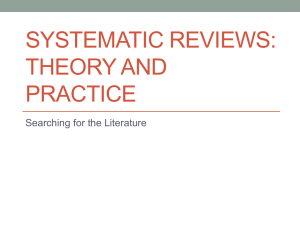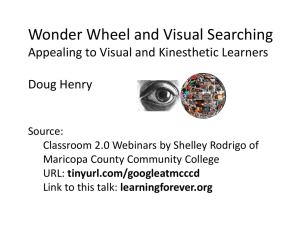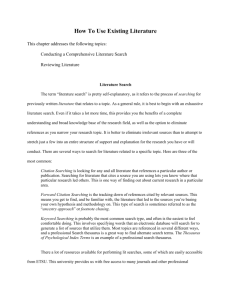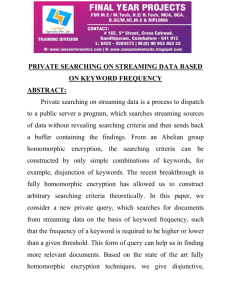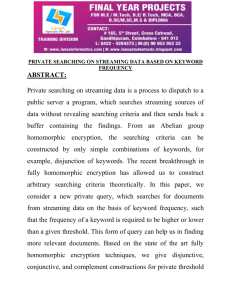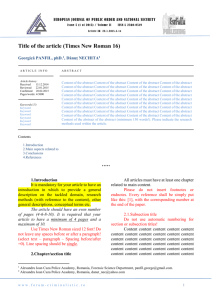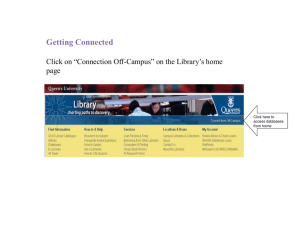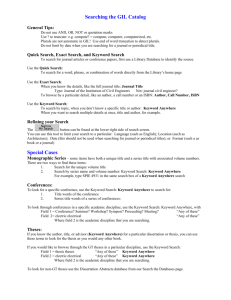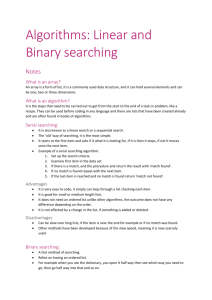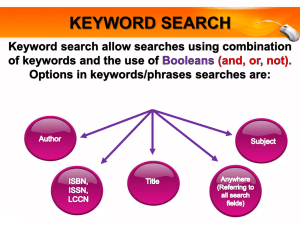7th Grade Conducting Research Lesson
advertisement
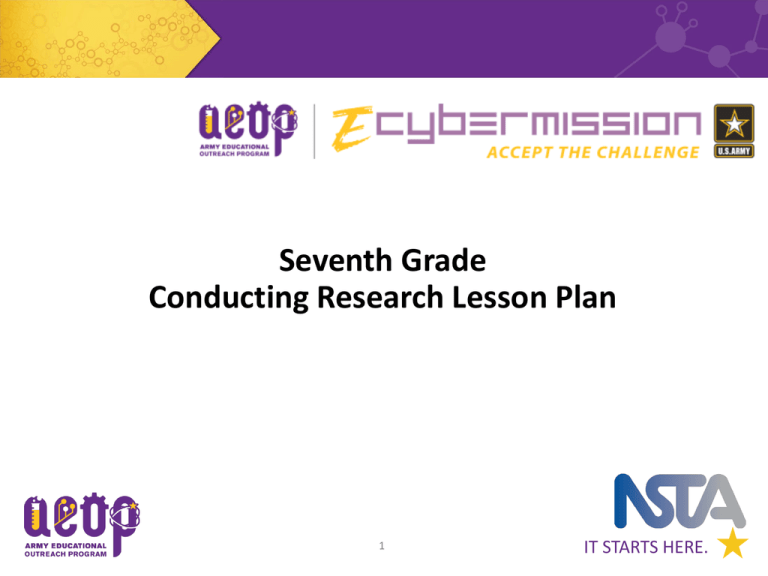
Seventh Grade Conducting Research Lesson Plan 1 IT STARTS HERE. Step-by-Step Process • • • • • • • Choosing a Topic or Defining a Task Developing Questions Finding Sources Selecting and Evaluating Sources Recording and Organizing Information Making the Product Evaluating the Work 2 IT STARTS HERE. Step 1: Choosing a Topic or Defining a Task • Narrow or broaden the topic • Note what is already known • Get an overview of the topic – Learn a little bit about the topic • Explain the purpose – state the purpose – What am I doing? – Why am I doing this? 3 IT STARTS HERE. Step 2: Developing Questions • • • • • Speeds up research Adds purpose to the search Adds direction for gathering information Focuses attention of the searcher Let’s practice with the Aquaduct Bike – http://theaquaduct.blogspot.com 4 IT STARTS HERE. Generating Questions • Use research phrases to prompt research questions: • It might be interesting to know if . . . • It might be interesting to know that . . . • It might be interesting to know when . . . • It might be interesting to know how . . . • Historically, I wonder how . . . • I wonder if . . . Is related to . . . • I wonder what influences . . . • I wonder what causes . . . 5 IT STARTS HERE. Step 3: Finding Sources • What are the possible sources? • Where can I find these sources? 6 IT STARTS HERE. What Are Possible Sources? • Books • Journals • • • • • • Research from scholars Reference works (i.e. dictionaries, encyclopedias, etc.) Magazine articles Newspaper articles Web sites Interviews 7 IT STARTS HERE. Myth: You can find everything you need for your research on the Internet. • Too much information has been written to have it all on the Internet • Copyright doesn’t allow everything to be on the Internet 8 IT STARTS HERE. Keyword Searching • Keyword searching is very powerful • Keyword searching is very fast • Very often this is the only searching option especially when using a search engine on the Internet 9 IT STARTS HERE. Keyword Searching • Remember a computer is really pretty stupid; it is fast and manipulate information, but it cannot THINK! • Most of the time it doesn’t even know that a car and an automobile are the same thing. • You need to know how to speak the computer’s language. 10 IT STARTS HERE. Step 4: Selecting and Evaluating Sources • Decide which sources to use • Sources must contain answers to questions asked • Evaluate the sources 11 IT STARTS HERE. Why Did He Create This Site? • Because he could! • No Internet police • No regulations • To teach!! • What is the next question? 12 IT STARTS HERE. Question • How do you know a website is good/credible? • Answer: – We have to learn to evaluate. 13 IT STARTS HERE. Evaluation • LINK to Wolfgram site: • This is a good site! • This tells us what to think about before using an informational website 14 IT STARTS HERE. Credibility • Who is responsible? • Any qualifications? – Usually found at beginning or end of site • What organization do they represent? – Have you heard of this organization? – Check the homepage • Links? • How do we verify credibility? – Postal address – Telephone number – E-mail?? --- NO NO NO not enough! 15 IT STARTS HERE. Accuracy • Date? • Revision Date? • Errors? – Spelling? – Grammar? 16 IT STARTS HERE. Reasonableness • Emotionalism? (Mr. Bunny!) • Purpose of the site? • Bias? – Identify bias in your research! • Advertising? 17 IT STARTS HERE. Support • Information in any other place? • Domain – http://www.west-fargo.k12.nd.us – .k12 – School – .edu – College or University – .com – Commercial – .net – Internet Resource – .org – Nonprofit Organization – .gov - Government 18 IT STARTS HERE. Decision Time! • Do you or do you not use the site? – No, if you cannot verify the authors or sponsoring organization • Then you need to carefully decide considering all of the criteria C A R S 19 IT STARTS HERE. C A R S •Credibility? •Accuracy? •Reasonableness? •Support? 20 IT STARTS HERE. Let’s Use CARS • Sites to evaluate using CARS • http://www.whitehouse.net • http://www.theonion.com/articles/department-ofagriculture-locates-perfect-goat,33852/ • http://www.encyclopedia.com/topic/global_warmin g.aspx • http://www.wwii.org • http://www.pbs.org/wgbh/amex/vietnam 21 IT STARTS HERE. Step 5: Recording and Organizing Information • • • • Many different ways to record and organize Write in phrases Put in own words (NO plagiarism) Answer the questions 22 IT STARTS HERE. Four Items to Include on Card 1. TOPIC 2. WHERE YOU FOUND THE INFORMATION 3. PARAPHRASED INFORMATION YOU FOUND 4. PAGE YOU FOUND THIS FACT ON 23 IT STARTS HERE. Step 6: Making the Product • • • • • • Product must show what has been learned Be creative Many ideas for end products Synthesis must be evident Aquaduct of similar bike research product http://engin1000.pbworks.com/w/page/1894268 5/Bicyclepowered%20Water%20Pump%20%20%20Purifier 24 IT STARTS HERE. Step 7: Evaluating the Work • Decide on evaluation criteria ahead of time. • How did you meet expectations? • Did you have others look at your info and give advice? 25 IT STARTS HERE.
